2022年人教版中考英语二轮复习第四节 介词和介词短语课件(共66张PPT)
文档属性
| 名称 | 2022年人教版中考英语二轮复习第四节 介词和介词短语课件(共66张PPT) | 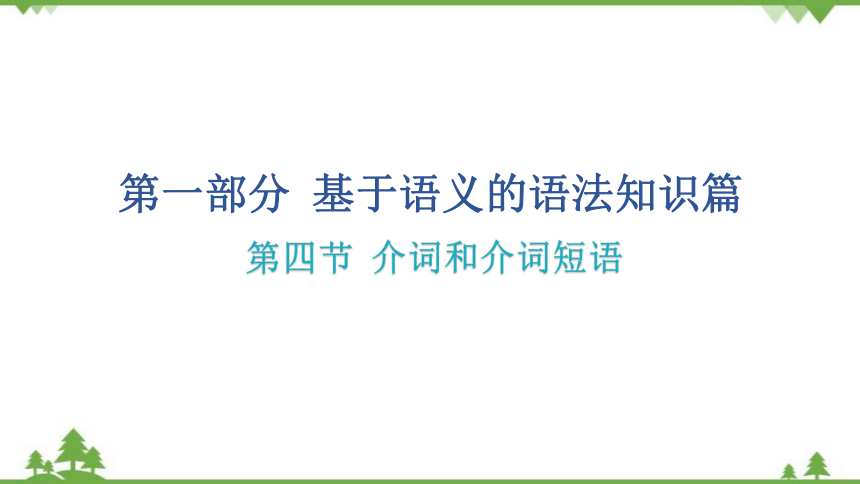 | |
| 格式 | pptx | ||
| 文件大小 | 1014.8KB | ||
| 资源类型 | 教案 | ||
| 版本资源 | 人教新目标(Go for it)版 | ||
| 科目 | 英语 | ||
| 更新时间 | 2022-05-27 21:28:32 | ||
图片预览

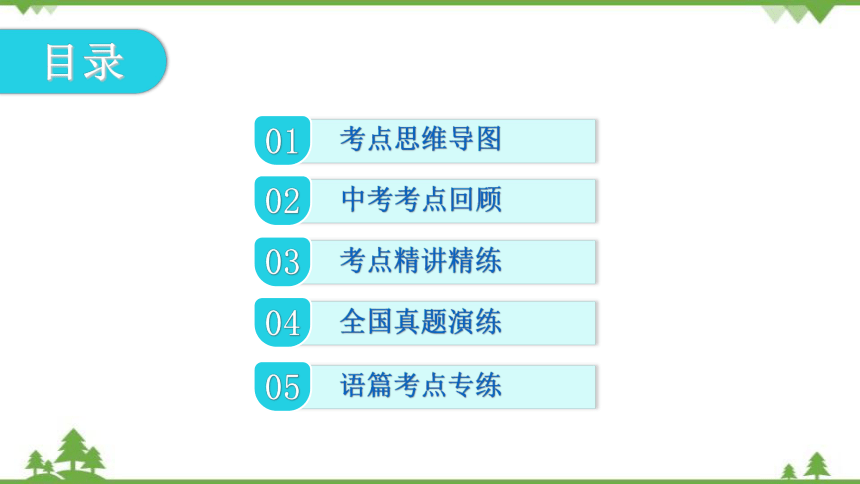
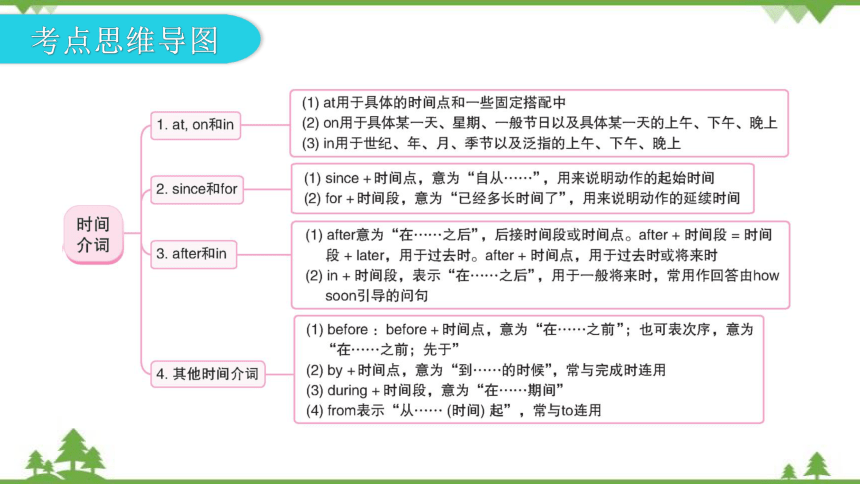

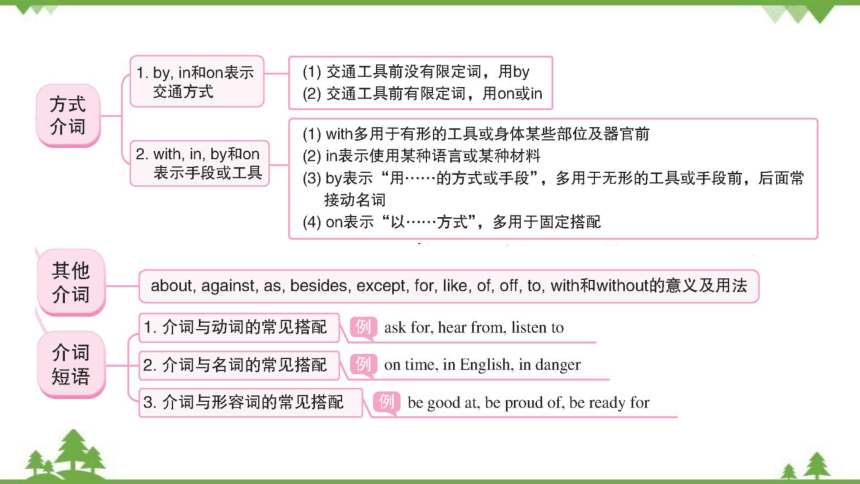
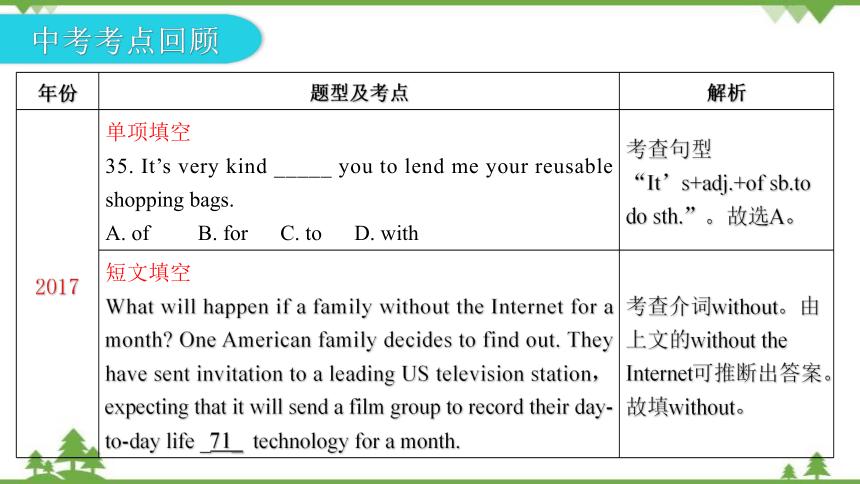
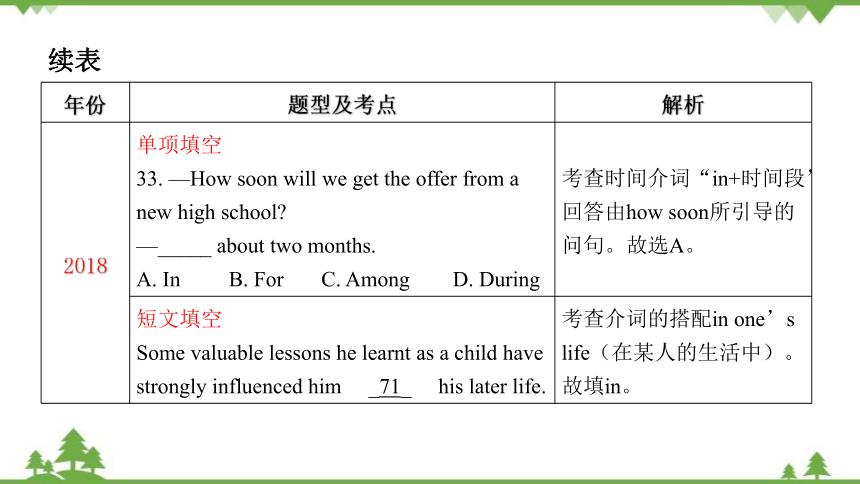
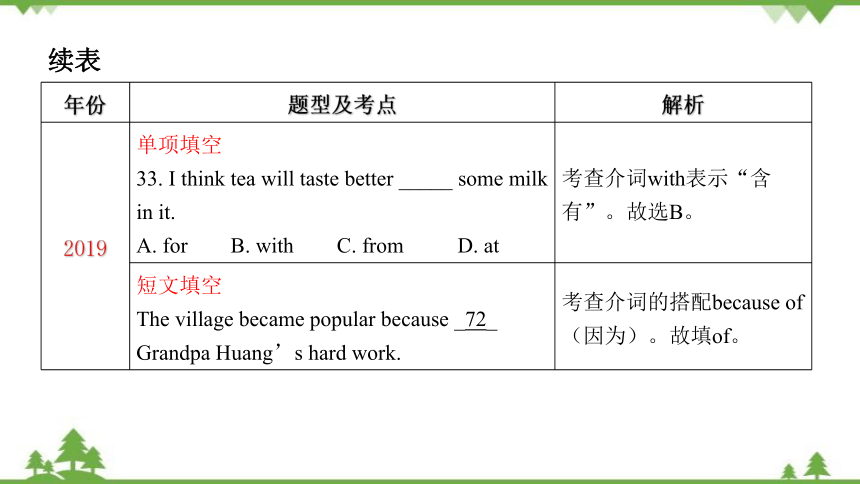
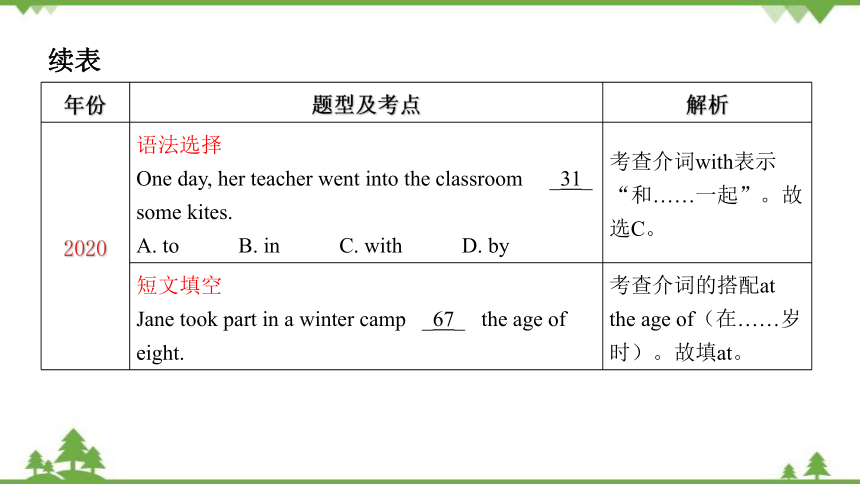
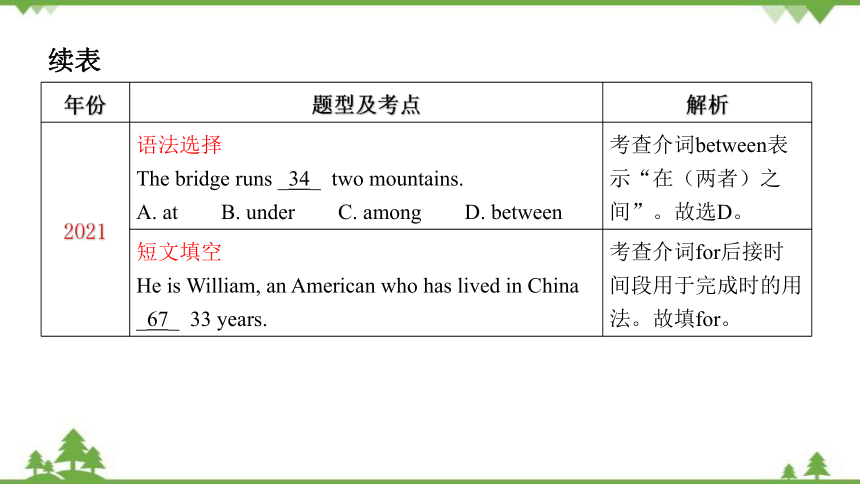
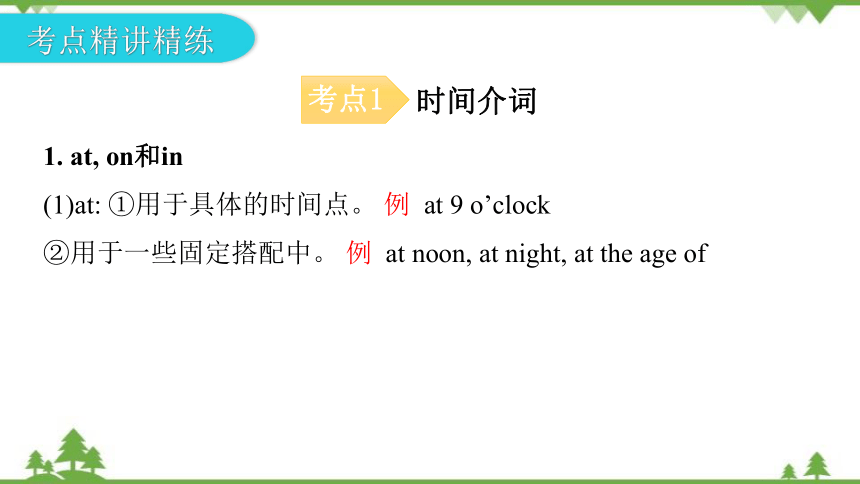
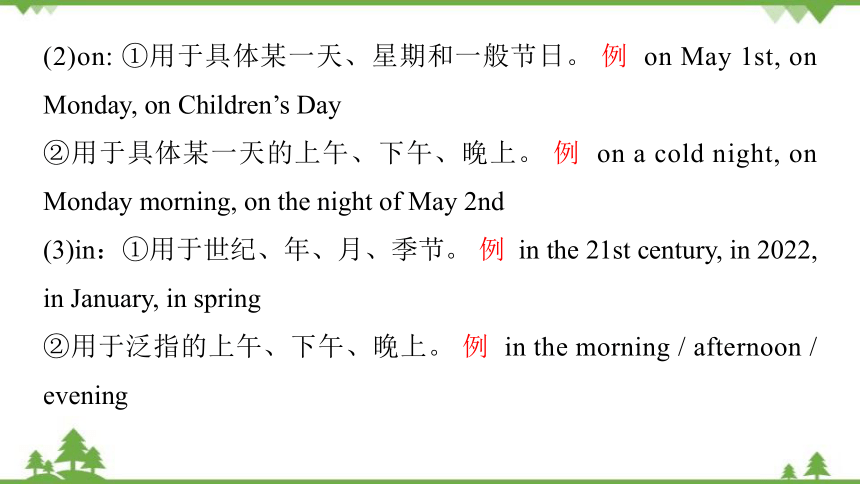
文档简介
(共66张PPT)
第一部分 基于语义的语法知识篇
第四节 介词和介词短语
目录
01
考点思维导图
02
中考考点回顾
03
考点精讲精练
04
全国真题演练
05
语篇考点专练
考点思维导图
中考考点回顾
年份 题型及考点 解析
2017 单项填空 35. It’s very kind _____ you to lend me your reusable shopping bags. A. of B. for C. to D. with 考查句型“It’s+adj.+of sb.to do sth.”。故选A。
短文填空 What will happen if a family without the Internet for a month One American family decides to find out. They have sent invitation to a leading US television station,expecting that it will send a film group to record their day-to-day life _71_ technology for a month. 考查介词without。由上文的without the Internet可推断出答案。故填without。
年份 题型及考点 解析
2018 单项填空 33. —How soon will we get the offer from a new high school —_____ about two months. A. In B. For C. Among D. During 考查时间介词“in+时间段”回答由how soon所引导的问句。故选A。
短文填空 Some valuable lessons he learnt as a child have strongly influenced him _71_ his later life.
考查介词的搭配in one’s life(在某人的生活中)。故填in。
续表
年份 题型及考点 解析
2019 单项填空 33. I think tea will taste better _____ some milk in it. A. for B. with C. from D. at 考查介词with表示“含有”。故选B。
短文填空 The village became popular because _72_ Grandpa Huang’s hard work.
考查介词的搭配because of(因为)。故填of。
续表
年份 题型及考点 解析
2020 语法选择 One day, her teacher went into the classroom _31_ some kites. A. to B. in C. with D. by 考查介词with表示“和……一起”。故选C。
短文填空 Jane took part in a winter camp _67_ the age of eight. 考查介词的搭配at the age of(在……岁时)。故填at。
续表
年份 题型及考点 解析
2021 语法选择 The bridge runs _34_ two mountains. A. at B. under C. among D. between 考查介词between表示“在(两者)之间”。故选D。
短文填空 He is William, an American who has lived in China _67_ 33 years. 考查介词for后接时间段用于完成时的用法。故填for。
续表
考点精讲精练
考点1
时间介词
1. at, on和in
(1)at: ①用于具体的时间点。 例 at 9 o’clock
②用于一些固定搭配中。 例 at noon, at night, at the age of
(2)on: ①用于具体某一天、星期和一般节日。 例 on May 1st, on Monday, on Children’s Day
②用于具体某一天的上午、下午、晚上。 例 on a cold night, on Monday morning, on the night of May 2nd
(3)in:①用于世纪、年、月、季节。 例 in the 21st century, in 2022, in January, in spring
②用于泛指的上午、下午、晚上。 例 in the morning / afternoon / evening
【注意】在this, that, last, next, every等词的前面不能再加介词。
例 I woke up at 6 o’clock this morning. 今天早晨我6点钟起床。
John will visit his grandparents next Sunday. 下周日约翰将去看望他的祖父母。
口诀一:点用at,段用in,日子前面加个on。
口诀二:in在年月季节前,on在星期日子前,at在钟点前,早晚下午
要用in,夜晚正午要用at,前有修饰要用on,of前面on代in。
2. since和for
(1)since+时间点,意为“自从……”,用来说明动作的起始时间。
例 I have learned English since ten years ago. 我自从10年前就开始学英语。
(2)for+时间段,意为“已经多长时间了”,用来说明动作的延续时间。
例 I have lived here for six years. 我住在这儿已经6年了。
【注意】since和for多与现在完成时态连用。
3. after和in
(1)after意为“在……之后”,后接时间段或时间点。after+时间段=时间段+later,用于过去时。after+时间点,用于过去时或将来时。
例 He returned after a month.= He returned a month later. 一个月后他回来了。
He came back after eight o’clock last evening. 他昨天晚上8点后回来的。
He will come back after eight o’clock this evening. 他将在今天晚上8点后回来。
(2)in+时间段,表示“在……之后”,用于一般将来时,常用来回答由how soon引导的问句。
例 —How soon will your father come back?你的爸爸多久后回来?
—He will come back in five days. 他将在5天后回来。
4. 其他时间介词
(1)before:
①before+时间点,意为“在……之前”。
例 I will go back to see you before ten o’clock. 我将在10点前回来看你。
②表次序,意为“在……之前;先于”。
例 We should wash our hands before eating. 在吃东西前我们应该先洗手。
(2)by+时间点,意为“到……的时候”,常与完成时连用。
例 By the time he was fifteen years old,he had learned chess all by himself for eight years. 到15岁的时候,他已经自学象棋8年了。
(3)during+时间段,意为“在……期间”。
例 During those three years, he worked very hard. 在那3年里,他非常努力地工作。
(4)from表示“从…… (时间)起”,常与to连用。
例 My father goes to work from Monday to Friday. 从星期一到星期五,我的爸爸都要上班。
( )1. The Communist Party of China had its 100th birthday _____ July 1st, 2021.
A. in B. at C. on D. for
( )2. The United Nations which tries to make our world safe was set up _____ 1945.
A. at B. in C. on D. of
C
B
( )3. More than one million UK students read more books ____ the COVID-19 lockdown(封锁).
A. before B. after C. during D. until
( )4. —How soon will we know the result of the final test
—_____ about three days.
A. In B. For C. Among D. During
C
A
( )5. —How long have you been a member of Green China
—_____ five years.
A. In B. For C. Since D. After
B
考点2
方位介词
1. in, on和to
(1)in表示在某一地区之内的某方位(属于该范围)。
例 Shanghai lies in the east of China. 上海位于中国的东部。
(2)on表示与某地是毗邻关系(两地接壤)。
例 Mongolia lies on the north of China. 蒙古位于中国的北面。
(3)to表示在某一地区之外的某方位(不属于该范围,也不接壤)。
例 Japan lies to the east of China. 日本在中国的东面。
2. on, over和above; under和below
(1)
(2)above zero 零度以上(指温度); below zero 零度以下(指温度)。
3. in front of和in the front of
(1)in front of表示 “在……的前面”(范围外)。
例 There are some trees in front of the classroom. 在教室前面有一些树。
(2)in the front of表示 “在……的前部”(范围内)。
例 Our teacher usually stands in the front of the classroom. 我们的老师经常站在教室的前面。
4. between和among
(1)between 表示“在(两者)之间”,常与and连用。
例 There is a chair between the desk and the bed. 书桌和床之间有一张椅子。
(2)among表示“在(三者或三者以上)之间”。
例 Among the three boys, Tom is the tallest one. 三个男孩中,汤姆是最高的。
5. across和through
(1)across表示“横过;穿过;越过”(从表面横过)。
例 The boy is swimming across the river. 那个男孩正在游过这条河。
(2)through表示“穿过;通过”(从空间内部穿过)。
例 The bird flew through the window. 鸟儿穿过窗户。
( )1. Hong Kong-Zhuhai-Macao Bridge was built _____ the sea, bringing great convenience to people of the three areas.
A. below B. on C. under D. over
( )2. China successfully landed the Zhurong rover ____ Mars in May, 2021.
A. in B. on C. at D. for
D
B
( )3. It is dangerous to send messages when you are walking _____ the street.
A. across B. through C. between D. among
( )4. Look! The sun is shining directly into the car. You’d better park it _____ the tree.
A. under B. below C. in front of D. behind
A
A
( )5. —Why are you standing, Tina
—I can’t see the screen clearly. Two tall boys are sitting _____ me.
A. behind B. next to
C. in front of D. in the front of
C
1. by, in和on表示交通方式
(1)如果交通工具前没有任何限定词,用by。
例 by plane 乘飞机,by bike 骑自行车,by car 乘汽车
(2)如果交通工具前有冠词、物主代词、指示代词等限定词修饰,则用on或in。
例 in this car 乘坐这辆汽车,on an early train 乘坐早班的火车
考点3
方式介词
【注意】步行、骑马、骑自行车均用on。
例 on foot 步行,on a horse 骑马,on my bike骑我的自行车
2. with, in, by和on表示手段或工具
(1)with多用于有形的工具或身体某些部位及器官前。
例 with a pen用钢笔,with our ears用我们的耳朵
(2)in表示使用某种语言或使用某种材料。
例 in English 用英语,in blue ink 用蓝墨水
(3)by表示 “用……的方式或手段”,多用于无形的工具或手段前,后面常接动名词。
例 by singing songs 通过唱歌
(4)on表示 “以……方式”,多用于固定搭配。
例 on the telephone 通过电话/在电话上,on the radio/on TV通过收音机/电视,on the Internet 在互联网上
( )1. My mom always buys things _____ the Internet because she thinks it is easy and convenient.
A. with B. in C. by D. on
( )2. You may cut the beef _____ this knife, but you must be careful since it is very sharp.
A. with B. in C. by D. on
D
A
( )3. The headmaster spoke _____ a loud voice so that he could get every student’s attention.
A. with B. in C. by D. on
( )4. I usually get to my office _____ subway. But this morning, I went to work _____ my friend’s car.
A. by; by B. by; in C. in; by D. in; in
B
B
( )5. We can help the left-behind children (留守儿童) _____ paying more attention to them.
A. with B. in C. by D. on
C
考点4
其他介词的用法及辨析
介词 意义及用法 举例
about “大约……” About 300 students want to be volunteers. 大约有300名学生想成为志愿者。
“关于” I am reading a book about Hawking. 我正在读一本关于霍金的书。
against “反对;违背” They are strongly against the idea. 他们强烈反对这个主意。
“撞击;碰着” Tom hit his head against a tree in the dark. 黑暗中汤姆的头撞到一棵树。
续表
介词 意义及用法 举例
as “作为;以……的身份” As a student, we should hand in homework on time. 作为一名学生,我们应该按时交作业。
besides “除……之外还有”(包含在内) What language do you know besides English 除了英语,你还会什么语言?
except “除……之外”(排除在外),是从整体中除去一部分 We will travel to Beijing except Jack. 除了杰克,我们都会去北京旅游。
续表
介词 意义及用法 举例
for 表目的或功能 She is waiting for the bus. 她正在等公交车。
“给;对;供”,表对象、用途 It’s a book for children. 这是一本儿童读物。
“因为;由于”,表原因 Guangzhou is famous for its delicious food. 广州因它的美食而出名。
“以帮助;为了” What can I do for you 有什么事我可以为你效劳?
续表
介词 意义及用法 举例
for “对……来说”,用于句型:It’s+adj.+for sb.to do sth. 对某人来说做某事是怎样的 It is important for us to form good learning habits. 对我们来说,养成良好的学习习惯很重要。
like “像/和……一样”,常与系动词连用 That sounds like an interesting story. 那听起来像是一个有趣的故事。
续表
介词 意义及用法 举例
of “……的”,表示所属关系 Tom is a friend of mine. 汤姆是我的一个朋友。
用于句型: It’s+adj.+of sb.to do sth. 某人做某事是……的(表示某人的性格特征) It is kind of you to help others. 你帮助别人,真是善良。
off “离开;脱离” Keep off the grass. 请勿踩踏草地。
to 表示动作的方向 I walked to school this morning. 今天上午我步行上学。
续表
介词 意义及用法 举例
with “带有;具有;含有” The girl with short hair over there is my younger sister. 那边那个短头发的女孩就是我的妹妹。
“和……一起” Can you go to the movies with me? 你可以和我一起去看电影吗?
without “没有” I can’t finish the task without your help. 没有你的帮助,我无法完成任务。
( )1. —Why are you so strongly _____ leaving children alone at home
—I think they are too young to take care of themselves.
A. on B. in C. for D. against
( )2. When I grow up, I want to be a kind, hard-working and fantastic doctor _____ Zhong Nanshan.
A.against B. like C. except D. with
D
B
( )3. I like eating rice _____ beef and potatoes. It’s delicious.
A. in B. on C. with D. for
( )4. Our country has made great progress in the fight _____ blue skies and clear waters.
A. in B. for C. against D. between
( )5. It’s not a good idea to study for a whole day _____ a break.
A. for B. to C. with D. without
C
B
D
1. 介词与动词的常见搭配
ask for 要;请求 hear from 收到……来信
wait for 等待 learn from 向……学习
leave for 前往 send for 派人去请
think of 认为;想起 listen to 听
depend on 依靠 laugh at 嘲笑
look after 照顾 look for 寻找
arrive in/at 到达 worry about 担心
regard ... as 把……当作
考点5
介词短语
2. 介词与名词的常见搭配
on time 准时 in English 用英语
on one’s way to 在某人去……的路上 in danger处于危险中
in fact 事实上 on the left/right 在左/右边
with/without one’s help 有/没有某人的帮助
to one’s surprise 使某人惊讶的是
3. 介词与形容词的常见搭配
be good at 擅长
be proud of 为……而感到自豪
be full of/be filled with 充满 be afraid of 害怕
be busy with 忙于 be kind to 对……友好
be strict with 对……要求严格
be ready for 为……做准备 be late for 迟到
( )1. Ken is an independent boy. His parents are proud _____ him.
A. on B. to C. in D. of
( )2. —Does the old man have to look _____his wife
—Yes. They have no children to depend on.
A. after B. for C. up D. like
D
A
( )3. As a middle school student, you should learn to depend _____ yourself to make a decision.
A. of B. with C. for D. on
( )4. _____ our surprise, Su Bingtian became the first China’s athlete that got in the final of the men’s 100 m competition at the 2020 Tokyo Olympics.
A. On B. To C. For D. At
D
B
C
( )5. _____ the help of the policeman, he got back the car he had lost.
A. Against B. Behind C. With D. Without
编者按 更多介词辨析及短语归纳可见于《中考高频词汇突破》,并建议结合《早读本》进行记忆
全国真题演练
( )1. Cathy always makes good use of her time to study, even _____ her lunch break. (2021抚顺)
A. around B. during C. from D. between
( )2. —Do you like the present, Cindy
—Oh, I’ve been thirsty _____ such a dictionary. I’m really thankful _____ you. (2021滨州)
A. for; to B. with; for C. about; with D. to; about
B
A
( )3. —I hear your brother will enter Tsinghua University this summer.
—Exactly, he was a born genius. He was able to read and write _____ the age of 4. (2021南通)
A. in B. on C. at D. of
( )4. The sun shone _____ the window and left a tiny rainbow on the wall. (2021无锡)
A. beyond B. along C. through D. across
C
C
( )5. Thanks to the video Visiting the World Online, we can enjoy the sights _____ leaving home. (2021黑龙江)
A. with B. by C. without
( )6. Look at that farmer. I feel very sorry _____ him. (2021广州)
A. of B. on C. for D. with
C
C
( )7. Mr. Smith always encourages his students to be active _____ class.(2020上海)
A. in B. by C. with D. from
( )8. The ancient town has been open to visitors _____ about ten years.(2020上海)
A. by B. for C. on D. though
A
B
( )9. Nanjing Zijinshan Insect Museum, which will be open to the public soon, was formed at the foot of Zhongshan _____ April 2nd. (2020南京)
A. in B. on C. at D. from
( )10. To complete her online learning, Suzy needs a computer or a mobile phone to receive messages _____ her teachers. (2020连云港)
A. with B. during C. from D. through
B
C
一、语法选择
Jack and Mary just got married and they didn’t have much money. So the young couple bought a house _1_ Jack’s two elderly sisters. They had lived there _2_ 30 years. The house was nice and the couple bought it _3_ a low price. The couple was very happy.
语篇考点专练
from
for
at
However, winter was not far away at the time. The couple was a little bit worried _4_ how they would keep the old house warm. The house didn’t have any fireplaces or heaters (加热器). At first, they planned to buy some heaters _5_ the long cold winter. But later, they thought that if the elderly sisters could stay warm and comfortable _6_ the old house during the winter in years past, so could they. Therefore, they just decided to wait for winter to come and did not make any preparations.
about
for
in
Winter arrived and temperatures soon dropped _7_ zero. The house became freezing cold. The walls were covered _8_ frost (霜). Life inside the house became very hard. Finally, the husband couldn’t stand it anymore and called the elderly sisters to ask them how they managed to keep the house warm _9_ the winter. After speaking to them _10_ the phone, the husband spoke to his wife, “For the last 30 years, my sisters have spent every winter on vacation in Thailand.”
below
with
during
on
( )1. A. with B. for C. of D. from
( )2. A. in B. on C. for D. since
( )3. A. at B. with C. on D. for
( )4. A. for B. about C. with D. of
( )5. A. of B. for C. during D. in
D
C
A
B
B
( )6. A. to B. on C. in D. with
( )7. A. under B. below C. over D. above
( )8. A. of B. at C. with D. in
( )9. A. during B. before C. after D. until
( )10. A. with B. by C. in D. on
C
B
C
A
D
二、短文填空
In 1988, Wang Chengbang retired(退休)from the army. Instead of enjoying a relaxing life, he volunteered to save the soil from desertification(沙漠化)_1_ planting trees in Korla, Xinjiang. Now _2_ the age of 85, Wang Chengbang is still working.
by
at
The high temperature in Korla makes it difficult for anyone to work day _3_ day in the sunshine. Besides, water is a big problem. In fact Wang Chengbang’s work in the first few years failed as very few trees survived(存活).
But Wang Chengbang would not give _4_. “After trying many different ways, I have learned how to grow young trees _5_ a better way,” said Wang Chengbang. He also looked _6_
after
up
in
for
new ways to save water. _7_ his hard work, more and more trees have survived. So far, he has planted more than 1.5 million trees. Those green trees prevent desertification, make the air cleaner and protect people _8_ the hot sun. Now, Korla is a model city in environmental protection.
Wang Chengbang is also successful in fighting cancer(癌症). _9_ 2005, he had cancer and was told that he had only six
With
from
In
months to live. However, he continued taking care _10_ his trees rather than lying on the hospital bed. “Working is the best medicine. Planting trees helps to fight cancer,” he often jokes.
of
1. _____________ 2. ______________
3. _____________ 4. ______________
5. _____________ 6. ______________
7. _____________ 8. ______________
9. _____________ 10. _____________
by
at
after
up
in
for
With
from
In
of
谢 谢!
第一部分 基于语义的语法知识篇
第四节 介词和介词短语
目录
01
考点思维导图
02
中考考点回顾
03
考点精讲精练
04
全国真题演练
05
语篇考点专练
考点思维导图
中考考点回顾
年份 题型及考点 解析
2017 单项填空 35. It’s very kind _____ you to lend me your reusable shopping bags. A. of B. for C. to D. with 考查句型“It’s+adj.+of sb.to do sth.”。故选A。
短文填空 What will happen if a family without the Internet for a month One American family decides to find out. They have sent invitation to a leading US television station,expecting that it will send a film group to record their day-to-day life _71_ technology for a month. 考查介词without。由上文的without the Internet可推断出答案。故填without。
年份 题型及考点 解析
2018 单项填空 33. —How soon will we get the offer from a new high school —_____ about two months. A. In B. For C. Among D. During 考查时间介词“in+时间段”回答由how soon所引导的问句。故选A。
短文填空 Some valuable lessons he learnt as a child have strongly influenced him _71_ his later life.
考查介词的搭配in one’s life(在某人的生活中)。故填in。
续表
年份 题型及考点 解析
2019 单项填空 33. I think tea will taste better _____ some milk in it. A. for B. with C. from D. at 考查介词with表示“含有”。故选B。
短文填空 The village became popular because _72_ Grandpa Huang’s hard work.
考查介词的搭配because of(因为)。故填of。
续表
年份 题型及考点 解析
2020 语法选择 One day, her teacher went into the classroom _31_ some kites. A. to B. in C. with D. by 考查介词with表示“和……一起”。故选C。
短文填空 Jane took part in a winter camp _67_ the age of eight. 考查介词的搭配at the age of(在……岁时)。故填at。
续表
年份 题型及考点 解析
2021 语法选择 The bridge runs _34_ two mountains. A. at B. under C. among D. between 考查介词between表示“在(两者)之间”。故选D。
短文填空 He is William, an American who has lived in China _67_ 33 years. 考查介词for后接时间段用于完成时的用法。故填for。
续表
考点精讲精练
考点1
时间介词
1. at, on和in
(1)at: ①用于具体的时间点。 例 at 9 o’clock
②用于一些固定搭配中。 例 at noon, at night, at the age of
(2)on: ①用于具体某一天、星期和一般节日。 例 on May 1st, on Monday, on Children’s Day
②用于具体某一天的上午、下午、晚上。 例 on a cold night, on Monday morning, on the night of May 2nd
(3)in:①用于世纪、年、月、季节。 例 in the 21st century, in 2022, in January, in spring
②用于泛指的上午、下午、晚上。 例 in the morning / afternoon / evening
【注意】在this, that, last, next, every等词的前面不能再加介词。
例 I woke up at 6 o’clock this morning. 今天早晨我6点钟起床。
John will visit his grandparents next Sunday. 下周日约翰将去看望他的祖父母。
口诀一:点用at,段用in,日子前面加个on。
口诀二:in在年月季节前,on在星期日子前,at在钟点前,早晚下午
要用in,夜晚正午要用at,前有修饰要用on,of前面on代in。
2. since和for
(1)since+时间点,意为“自从……”,用来说明动作的起始时间。
例 I have learned English since ten years ago. 我自从10年前就开始学英语。
(2)for+时间段,意为“已经多长时间了”,用来说明动作的延续时间。
例 I have lived here for six years. 我住在这儿已经6年了。
【注意】since和for多与现在完成时态连用。
3. after和in
(1)after意为“在……之后”,后接时间段或时间点。after+时间段=时间段+later,用于过去时。after+时间点,用于过去时或将来时。
例 He returned after a month.= He returned a month later. 一个月后他回来了。
He came back after eight o’clock last evening. 他昨天晚上8点后回来的。
He will come back after eight o’clock this evening. 他将在今天晚上8点后回来。
(2)in+时间段,表示“在……之后”,用于一般将来时,常用来回答由how soon引导的问句。
例 —How soon will your father come back?你的爸爸多久后回来?
—He will come back in five days. 他将在5天后回来。
4. 其他时间介词
(1)before:
①before+时间点,意为“在……之前”。
例 I will go back to see you before ten o’clock. 我将在10点前回来看你。
②表次序,意为“在……之前;先于”。
例 We should wash our hands before eating. 在吃东西前我们应该先洗手。
(2)by+时间点,意为“到……的时候”,常与完成时连用。
例 By the time he was fifteen years old,he had learned chess all by himself for eight years. 到15岁的时候,他已经自学象棋8年了。
(3)during+时间段,意为“在……期间”。
例 During those three years, he worked very hard. 在那3年里,他非常努力地工作。
(4)from表示“从…… (时间)起”,常与to连用。
例 My father goes to work from Monday to Friday. 从星期一到星期五,我的爸爸都要上班。
( )1. The Communist Party of China had its 100th birthday _____ July 1st, 2021.
A. in B. at C. on D. for
( )2. The United Nations which tries to make our world safe was set up _____ 1945.
A. at B. in C. on D. of
C
B
( )3. More than one million UK students read more books ____ the COVID-19 lockdown(封锁).
A. before B. after C. during D. until
( )4. —How soon will we know the result of the final test
—_____ about three days.
A. In B. For C. Among D. During
C
A
( )5. —How long have you been a member of Green China
—_____ five years.
A. In B. For C. Since D. After
B
考点2
方位介词
1. in, on和to
(1)in表示在某一地区之内的某方位(属于该范围)。
例 Shanghai lies in the east of China. 上海位于中国的东部。
(2)on表示与某地是毗邻关系(两地接壤)。
例 Mongolia lies on the north of China. 蒙古位于中国的北面。
(3)to表示在某一地区之外的某方位(不属于该范围,也不接壤)。
例 Japan lies to the east of China. 日本在中国的东面。
2. on, over和above; under和below
(1)
(2)above zero 零度以上(指温度); below zero 零度以下(指温度)。
3. in front of和in the front of
(1)in front of表示 “在……的前面”(范围外)。
例 There are some trees in front of the classroom. 在教室前面有一些树。
(2)in the front of表示 “在……的前部”(范围内)。
例 Our teacher usually stands in the front of the classroom. 我们的老师经常站在教室的前面。
4. between和among
(1)between 表示“在(两者)之间”,常与and连用。
例 There is a chair between the desk and the bed. 书桌和床之间有一张椅子。
(2)among表示“在(三者或三者以上)之间”。
例 Among the three boys, Tom is the tallest one. 三个男孩中,汤姆是最高的。
5. across和through
(1)across表示“横过;穿过;越过”(从表面横过)。
例 The boy is swimming across the river. 那个男孩正在游过这条河。
(2)through表示“穿过;通过”(从空间内部穿过)。
例 The bird flew through the window. 鸟儿穿过窗户。
( )1. Hong Kong-Zhuhai-Macao Bridge was built _____ the sea, bringing great convenience to people of the three areas.
A. below B. on C. under D. over
( )2. China successfully landed the Zhurong rover ____ Mars in May, 2021.
A. in B. on C. at D. for
D
B
( )3. It is dangerous to send messages when you are walking _____ the street.
A. across B. through C. between D. among
( )4. Look! The sun is shining directly into the car. You’d better park it _____ the tree.
A. under B. below C. in front of D. behind
A
A
( )5. —Why are you standing, Tina
—I can’t see the screen clearly. Two tall boys are sitting _____ me.
A. behind B. next to
C. in front of D. in the front of
C
1. by, in和on表示交通方式
(1)如果交通工具前没有任何限定词,用by。
例 by plane 乘飞机,by bike 骑自行车,by car 乘汽车
(2)如果交通工具前有冠词、物主代词、指示代词等限定词修饰,则用on或in。
例 in this car 乘坐这辆汽车,on an early train 乘坐早班的火车
考点3
方式介词
【注意】步行、骑马、骑自行车均用on。
例 on foot 步行,on a horse 骑马,on my bike骑我的自行车
2. with, in, by和on表示手段或工具
(1)with多用于有形的工具或身体某些部位及器官前。
例 with a pen用钢笔,with our ears用我们的耳朵
(2)in表示使用某种语言或使用某种材料。
例 in English 用英语,in blue ink 用蓝墨水
(3)by表示 “用……的方式或手段”,多用于无形的工具或手段前,后面常接动名词。
例 by singing songs 通过唱歌
(4)on表示 “以……方式”,多用于固定搭配。
例 on the telephone 通过电话/在电话上,on the radio/on TV通过收音机/电视,on the Internet 在互联网上
( )1. My mom always buys things _____ the Internet because she thinks it is easy and convenient.
A. with B. in C. by D. on
( )2. You may cut the beef _____ this knife, but you must be careful since it is very sharp.
A. with B. in C. by D. on
D
A
( )3. The headmaster spoke _____ a loud voice so that he could get every student’s attention.
A. with B. in C. by D. on
( )4. I usually get to my office _____ subway. But this morning, I went to work _____ my friend’s car.
A. by; by B. by; in C. in; by D. in; in
B
B
( )5. We can help the left-behind children (留守儿童) _____ paying more attention to them.
A. with B. in C. by D. on
C
考点4
其他介词的用法及辨析
介词 意义及用法 举例
about “大约……” About 300 students want to be volunteers. 大约有300名学生想成为志愿者。
“关于” I am reading a book about Hawking. 我正在读一本关于霍金的书。
against “反对;违背” They are strongly against the idea. 他们强烈反对这个主意。
“撞击;碰着” Tom hit his head against a tree in the dark. 黑暗中汤姆的头撞到一棵树。
续表
介词 意义及用法 举例
as “作为;以……的身份” As a student, we should hand in homework on time. 作为一名学生,我们应该按时交作业。
besides “除……之外还有”(包含在内) What language do you know besides English 除了英语,你还会什么语言?
except “除……之外”(排除在外),是从整体中除去一部分 We will travel to Beijing except Jack. 除了杰克,我们都会去北京旅游。
续表
介词 意义及用法 举例
for 表目的或功能 She is waiting for the bus. 她正在等公交车。
“给;对;供”,表对象、用途 It’s a book for children. 这是一本儿童读物。
“因为;由于”,表原因 Guangzhou is famous for its delicious food. 广州因它的美食而出名。
“以帮助;为了” What can I do for you 有什么事我可以为你效劳?
续表
介词 意义及用法 举例
for “对……来说”,用于句型:It’s+adj.+for sb.to do sth. 对某人来说做某事是怎样的 It is important for us to form good learning habits. 对我们来说,养成良好的学习习惯很重要。
like “像/和……一样”,常与系动词连用 That sounds like an interesting story. 那听起来像是一个有趣的故事。
续表
介词 意义及用法 举例
of “……的”,表示所属关系 Tom is a friend of mine. 汤姆是我的一个朋友。
用于句型: It’s+adj.+of sb.to do sth. 某人做某事是……的(表示某人的性格特征) It is kind of you to help others. 你帮助别人,真是善良。
off “离开;脱离” Keep off the grass. 请勿踩踏草地。
to 表示动作的方向 I walked to school this morning. 今天上午我步行上学。
续表
介词 意义及用法 举例
with “带有;具有;含有” The girl with short hair over there is my younger sister. 那边那个短头发的女孩就是我的妹妹。
“和……一起” Can you go to the movies with me? 你可以和我一起去看电影吗?
without “没有” I can’t finish the task without your help. 没有你的帮助,我无法完成任务。
( )1. —Why are you so strongly _____ leaving children alone at home
—I think they are too young to take care of themselves.
A. on B. in C. for D. against
( )2. When I grow up, I want to be a kind, hard-working and fantastic doctor _____ Zhong Nanshan.
A.against B. like C. except D. with
D
B
( )3. I like eating rice _____ beef and potatoes. It’s delicious.
A. in B. on C. with D. for
( )4. Our country has made great progress in the fight _____ blue skies and clear waters.
A. in B. for C. against D. between
( )5. It’s not a good idea to study for a whole day _____ a break.
A. for B. to C. with D. without
C
B
D
1. 介词与动词的常见搭配
ask for 要;请求 hear from 收到……来信
wait for 等待 learn from 向……学习
leave for 前往 send for 派人去请
think of 认为;想起 listen to 听
depend on 依靠 laugh at 嘲笑
look after 照顾 look for 寻找
arrive in/at 到达 worry about 担心
regard ... as 把……当作
考点5
介词短语
2. 介词与名词的常见搭配
on time 准时 in English 用英语
on one’s way to 在某人去……的路上 in danger处于危险中
in fact 事实上 on the left/right 在左/右边
with/without one’s help 有/没有某人的帮助
to one’s surprise 使某人惊讶的是
3. 介词与形容词的常见搭配
be good at 擅长
be proud of 为……而感到自豪
be full of/be filled with 充满 be afraid of 害怕
be busy with 忙于 be kind to 对……友好
be strict with 对……要求严格
be ready for 为……做准备 be late for 迟到
( )1. Ken is an independent boy. His parents are proud _____ him.
A. on B. to C. in D. of
( )2. —Does the old man have to look _____his wife
—Yes. They have no children to depend on.
A. after B. for C. up D. like
D
A
( )3. As a middle school student, you should learn to depend _____ yourself to make a decision.
A. of B. with C. for D. on
( )4. _____ our surprise, Su Bingtian became the first China’s athlete that got in the final of the men’s 100 m competition at the 2020 Tokyo Olympics.
A. On B. To C. For D. At
D
B
C
( )5. _____ the help of the policeman, he got back the car he had lost.
A. Against B. Behind C. With D. Without
编者按 更多介词辨析及短语归纳可见于《中考高频词汇突破》,并建议结合《早读本》进行记忆
全国真题演练
( )1. Cathy always makes good use of her time to study, even _____ her lunch break. (2021抚顺)
A. around B. during C. from D. between
( )2. —Do you like the present, Cindy
—Oh, I’ve been thirsty _____ such a dictionary. I’m really thankful _____ you. (2021滨州)
A. for; to B. with; for C. about; with D. to; about
B
A
( )3. —I hear your brother will enter Tsinghua University this summer.
—Exactly, he was a born genius. He was able to read and write _____ the age of 4. (2021南通)
A. in B. on C. at D. of
( )4. The sun shone _____ the window and left a tiny rainbow on the wall. (2021无锡)
A. beyond B. along C. through D. across
C
C
( )5. Thanks to the video Visiting the World Online, we can enjoy the sights _____ leaving home. (2021黑龙江)
A. with B. by C. without
( )6. Look at that farmer. I feel very sorry _____ him. (2021广州)
A. of B. on C. for D. with
C
C
( )7. Mr. Smith always encourages his students to be active _____ class.(2020上海)
A. in B. by C. with D. from
( )8. The ancient town has been open to visitors _____ about ten years.(2020上海)
A. by B. for C. on D. though
A
B
( )9. Nanjing Zijinshan Insect Museum, which will be open to the public soon, was formed at the foot of Zhongshan _____ April 2nd. (2020南京)
A. in B. on C. at D. from
( )10. To complete her online learning, Suzy needs a computer or a mobile phone to receive messages _____ her teachers. (2020连云港)
A. with B. during C. from D. through
B
C
一、语法选择
Jack and Mary just got married and they didn’t have much money. So the young couple bought a house _1_ Jack’s two elderly sisters. They had lived there _2_ 30 years. The house was nice and the couple bought it _3_ a low price. The couple was very happy.
语篇考点专练
from
for
at
However, winter was not far away at the time. The couple was a little bit worried _4_ how they would keep the old house warm. The house didn’t have any fireplaces or heaters (加热器). At first, they planned to buy some heaters _5_ the long cold winter. But later, they thought that if the elderly sisters could stay warm and comfortable _6_ the old house during the winter in years past, so could they. Therefore, they just decided to wait for winter to come and did not make any preparations.
about
for
in
Winter arrived and temperatures soon dropped _7_ zero. The house became freezing cold. The walls were covered _8_ frost (霜). Life inside the house became very hard. Finally, the husband couldn’t stand it anymore and called the elderly sisters to ask them how they managed to keep the house warm _9_ the winter. After speaking to them _10_ the phone, the husband spoke to his wife, “For the last 30 years, my sisters have spent every winter on vacation in Thailand.”
below
with
during
on
( )1. A. with B. for C. of D. from
( )2. A. in B. on C. for D. since
( )3. A. at B. with C. on D. for
( )4. A. for B. about C. with D. of
( )5. A. of B. for C. during D. in
D
C
A
B
B
( )6. A. to B. on C. in D. with
( )7. A. under B. below C. over D. above
( )8. A. of B. at C. with D. in
( )9. A. during B. before C. after D. until
( )10. A. with B. by C. in D. on
C
B
C
A
D
二、短文填空
In 1988, Wang Chengbang retired(退休)from the army. Instead of enjoying a relaxing life, he volunteered to save the soil from desertification(沙漠化)_1_ planting trees in Korla, Xinjiang. Now _2_ the age of 85, Wang Chengbang is still working.
by
at
The high temperature in Korla makes it difficult for anyone to work day _3_ day in the sunshine. Besides, water is a big problem. In fact Wang Chengbang’s work in the first few years failed as very few trees survived(存活).
But Wang Chengbang would not give _4_. “After trying many different ways, I have learned how to grow young trees _5_ a better way,” said Wang Chengbang. He also looked _6_
after
up
in
for
new ways to save water. _7_ his hard work, more and more trees have survived. So far, he has planted more than 1.5 million trees. Those green trees prevent desertification, make the air cleaner and protect people _8_ the hot sun. Now, Korla is a model city in environmental protection.
Wang Chengbang is also successful in fighting cancer(癌症). _9_ 2005, he had cancer and was told that he had only six
With
from
In
months to live. However, he continued taking care _10_ his trees rather than lying on the hospital bed. “Working is the best medicine. Planting trees helps to fight cancer,” he often jokes.
of
1. _____________ 2. ______________
3. _____________ 4. ______________
5. _____________ 6. ______________
7. _____________ 8. ______________
9. _____________ 10. _____________
by
at
after
up
in
for
With
from
In
of
谢 谢!
同课章节目录
- 词法
- 名词
- 动词和动词短语
- 动词语态
- 动词时态
- 助动词和情态动词
- 非谓语动词
- 冠词
- 代词
- 数词和量词
- 形容词副词及其比较等级
- 介词和介词短语
- 连词和感叹词
- 构词法
- 相似、相近词比较
- 句法
- 陈述句
- 一般疑问句和否定疑问句
- 特殊疑问句及选择疑问句
- 反意疑问句
- 存在句(There be句型)
- 宾语从句
- 定语从句
- 状语从句
- 主谓一致问题
- 简单句
- 并列句
- 复合句
- 主谓一致
- 主、表语从句
- 名词性从句
- 直接引语和间接引语
- 虚拟语气
- 感叹句
- 强调句
- 倒装句
- 祈使句
- 句子的成分
- 句子的分类
- 题型专区
- 单项选择部分
- 易错题
- 完形填空
- 阅读理解
- 词汇练习
- 听说训练
- 句型转换
- 补全对话
- 短文改错
- 翻译
- 书面表达
- 任务型阅读
- 语法填空
- 其他资料
